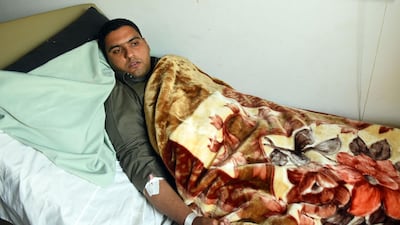With the sandals of their dead brothers and cousins still lying outside the Al Rowdah mosque, survivors of the massacre and relatives of the dead vowed to take revenge against the killers.
"We will not be consoled until each murderer in the Sinai is eliminated and no mercy will be shown," said the statement issued by the elders of the Union of Sinai Tribes which includes members from the El Tarabin, Rumeilat and Sawarka clans.
"The massacre that was carried out against the residents of Al Rawda village will turn into a burning fire that will eliminate you. We do not have trials or prisons."
The declaration was addressed directly to the perpetrators of the mosque attack, that so far has claimed 305 lives of Sawarka Bedouin who are affiliated spiritually with the mystical Gaririya Sufi order.
The primal call for vengeance came even as Egypt's air force continued to strike at terrorist hideouts in the North Sinai with the most modern jet fighters and drone aircraft.
While no group has claimed the responsibility for the Al Rowdah attack, neither the North Sinai Bedouin nor the Egyptian authorities doubt that it was the work of ISIL or one of its acolytes. Most of the terrorist attacks in North Sinai in recent years, mainly against security forces, have been claimed by Ansar Beit Al Maqdis, a group based in North Sinai and affiliated to ISIL.
Another candidate would be an Al Qaeda brigade led by Hesham Al Ashmawy, a former Egyptian special forces officer turned jihadist, and now Egypt's most wanted man. .
The Bedouins who live in that part of the northern Sinai believe Bir Al Abd village was targeted because the villages had repeatedly rebuffed attempts by ISIL's Sinai affiliate to recruit local tribesmen.
Carrying the black flag of Islamic State, the assailants arrived in off-road vehicles and tossed grenades into the mosque before opening fire on the worshippers just as the imam as about to begin his sermon. When they left, the carpets were covered in blood and bodies — 27 of them children.
"I found people piled on top of each other and they kept firing at anyone," said imam Mohamed Abdel Fattah from his hospital bed in Sharqiya city. "They fired at anyone who breathed."
________________________________
Read more:
Egypt mosque attack: 27 children among the hundreds dead
Egypt's ISIL affiliate kills 10 people in Sinai convoy attack
________________________________
Security guards blocked access to other hospitals where the injured were being treated to all but family members. They include Mahad Nasser Hospital in Cairo, where 17 of the injured are receiving treatment and the Dar Al Shefaa Hospital, also in Cairo, which is caring for 12 victims.
Egyptians have been left all the more stunned because the attack was directed at a mosque — a rarity in the country's history of Islamist insurgencies. The ease with which the perpetrators were able to mount such a comprehensive attack and kill more than 300 people highlights the threat militant groups continue to pose in the most populous Arab country.
After four years of battling ISIL in the Sinai, where the group has killed hundreds of soldiers and police, authorities still face an enemy with growing ambitions in Egypt, despite its defeats in Iraq, Syria and Libya.
The possibility that ultra-hardline Islamists are shifting tactics and picking new targets is worrying for Egypt, where successive governments have struggled to contain groups far less brazen than ISIL.
Egyptian leaders have adopted a zero-tolerance policy, with air strikes, raids on militant hideouts and long prison sentences. After this latest atrocity, President Abdel Fattah El Sisi has once again vowed to crush the militants and called for a comprehensive campaign to counter what he describes as the existential threat of radical jihadism, deploying moderate clerics to promote moderate Islam, for instance.
The people living in Bir Al Abd and places like it have known for more than a year that ISIL considered them a target because of their links to Sufism, a mystical form of Islam that hardline Islamist groups consider heretical.
A direct threat to Al Rowdah was made in an internet publication last December. There were more in early 2017 and in March, ISIL's Sinai branch posted a video purportedly showing militants beheading two elderly Sufi men in the desert after they were found guilty of witchcraft and sorcery. But police and army sources said there had been no specific threats against Sufis in Rawdah recently.
Egypt has about 15 million Sufis, and their shrines and saints appear in villages across the country.
_____________________________
Read more:
Egypt sticks to its guns in response to Sinai mosque carnage
The worst terrorist atrocity in Egypt's modern history calls for a tough response
Some thought the terrorists were after Egypt's Christians. Turns out, they are after everyone
______________________________

